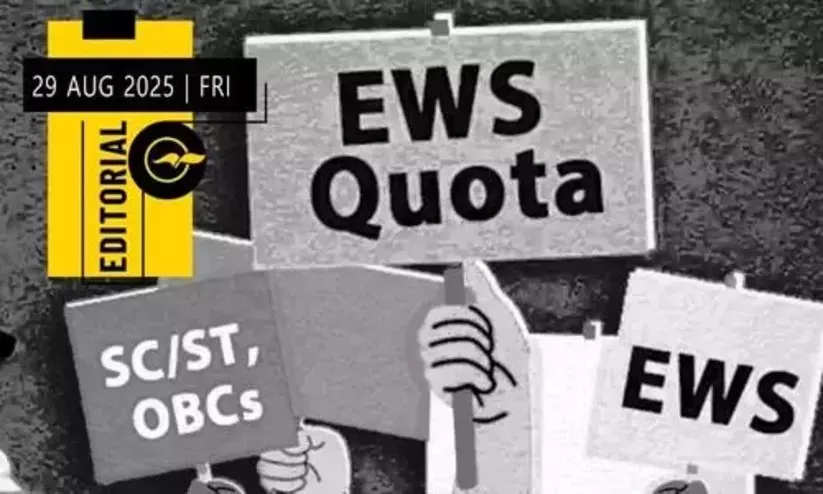
It is not reservation, but big plunder
text_fieldsThe debate over whether reservation, or quota, is meant for social equality or economic equality has existed since the concept of reservation was first introduced. However, our Constitution has made it clear that reservation is are intended to ensure social equality and social justice. It was only through subsequent amendments and interpretations by governments and the judiciary that this objective got diluted defying the Constitution. The most significant shift came with the introduction of the 10% quota for Economically Weaker Sections (EWS), which marked a deviation from the original objective. This dilution of the reservation policy becomes evident during the allotment for engineering admissions. To put it more clearly, students from upper-caste categories who are eligible under reservation can secure engineering seats in the state even if they rank below 60,000 in the entrance examinations. After the completion of four rounds of allotments by the Commissioner for Entrance Examinations, it was revealed that even the candidate ranked 66,078 under the EWS quota secured admission to a government engineering college, out of a list of 67,505 candidates. This shows that the EWS category is enjoying reservation benefits on par with caste-based reservation categories. In contrast, candidates from communities like Ezhavas and Muslims, who avail caste-based reservation, are behind the ranks of tens of thousands. This ratifies the claim that the 103rd Amendment, which established economic reservation, undermines the fundamental nature of the Constitution and eliminates the concept of reservation. One cannot call it reservation, but just plundering of resources.
Education is the key to a society's progress since it helps people advance socially in a number of fields. The simplest and most effective way to uplift a backward community and guide it towards progress is through education. Reservation in education for the disadvantaged sections was introduced as part of this vision. Similarly, reservations in employment were implemented to ensure their representation in positions of power and to provide them with a fair share in decision-making spaces. However, EWS quota has undermined this intent, effectively enabling extra empowerment of upper classes rather than uplifting the marginalised. In January 2019, through the 103rd Constitutional Amendment, Articles 15 and 16 were amended to introduce a 10% reservation for economically weaker sections among the forward communities. According to the amendment, this 10% reservation can be granted to economically weaker sections among the forward communities in both government jobs and admissions to educational institutions. With the full support of parties including the Congress and the CPI(M), the Modi-led central government passed this forward class reservation scheme. Kerala was one of the first states to implement the scheme with alacrity, even before several other BJP-ruled states. As part of this, reservations were introduced for economically weaker sections among general communities in PSC recruitments as well as in admissions to professional courses, including engineering and medicine. In the education sector, to ensure that neither the general merit seats nor other reserved category seats were reduced, an additional 10% of seats were created specifically for implementing the forward community quota. Economic reservation has also been implemented for higher secondary admissions.
Although the amendment was challenged in the Supreme Court, the Constitution Bench upheld the law. The argument that this decision undermines the original intent of the reservation, which is aimed at ensuring the welfare of socially disadvantaged sections, was not accepted by the court. This time, Kerala's Entrance Commissionerate has even extended the EWS reservation to minority-status institutions and made allotments accordingly. The allotment took place during the fourth phase of admissions. A similar attempt had been made earlier as well, but back then, following a report by Madhyamam, the issue sparked controversy and the decision was eventually reversed. However, even though Madhyamam highlighted the injustice this time also, the government has shown no willingness to correct the move. If this issue is not corrected through strong interventions now, this practice could become a precedent in the coming years. The constitutional amendment that introduced EWS reservation itself clearly states that EWS quota is not applicable to minority-status educational institutions. The related engineering admission prospectus also explicitly mentions this clause. Hence, it is evident that these actions are not taken out of ignorance. This is yet another move in the series of ongoing attempts against floating reservations and reservations for backwards communities. In the past, the upper-caste elite and mainstream media repeatedly argued that reservations reduce efficiency and even claimed that one could not trust doctors who secured admission through reserved seats. However, when candidates with ranks as low as 60,000 manage to secure admission by bypassing tens of thousands of others, the silence on the question of efficiency exposes the hypocrisy deeply rooted in public consciousness.





















